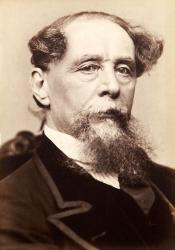Camden Town, London, England
Charles Dickens' family was never wealthy. However, for the first ten years of his life, Charles and his siblings lived a happy life between Portsmouth and then Chatham, Kent. They were able to explore the countryside and led a simple life. However, their parents lived beyond their means, and eventually moved to Camden Town, a neighborhood in London that was quite poor.
This is where Charles Dickens' life took a very dark turn. In 1824, John Dickens, Charles' father was sent to prison for failing to pay off his debts. In order to support the family, Charles was made to leave school and work at a boot-blacking factory. His job was to label the bottles of boot-blacking liquid. He earned only six shillings a week, and worked in horrid conditions, as did many of the children in Victorian England. He was forced into this lifestyle for over a year, and these events had a profound effect on both his mental state and his future writing. Themes of children who are taken advantage of or are lost pervade many of his future works, such as A Christmas Carol, Oliver Twist, and Great Expectations. His personal knowledge of this time gave great realism to the stories he eventually wrote, and allowed the many people who were exploited during this era to connect with his works.
Additionally, this time period also affected his views of women. Even after the debts had been repaid and it was possible for Charles to return to school, his mother wanted him to continue to work and provide additional income for the family. Charles understood the importance of education and enjoyed the little time that he spent in school. Luckily for him and for the literary world, his father's opinion of school won out and he was sent back, however this experience caused him to resent his mother. He believed that she did not appreciate the horrible experience that he experienced during his time at the factory, and that she cared more about her financial well-being than the safety and well-being of her child.
Works Cited:
Biography.com Editors. “Charles Dickens.” Biography.com, A&E Networks Television, 4 Mar. 2020, www.biography.com/writer/charles-dickens.
Collins, Philip. “Charles Dickens.” Encyclopædia Britannica, Encyclopædia Britannica, Inc., 10 Sept. 2020, www.britannica.com/biography/Charles-Dickens-British-novelist.
Parent Map
Coordinates
Longitude: -0.142551600000

